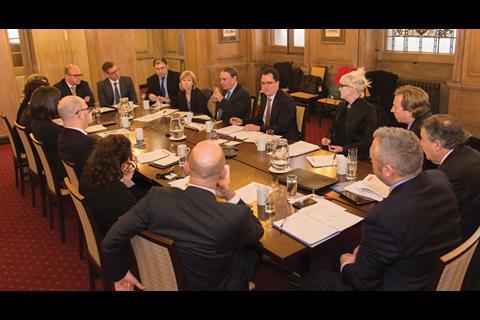Anxious business clients are queueing up for advice on the potential implications of a Brexit vote. As the Gazette’s latest roundtable heard, the legal services industry is also gripped by uncertainty. Paul Rogerson reports.
Law firms prepare for Brexit bonanza,’ a breathless Financial Times reported in January. But if commercial lawyers are relishing the prospect of casting the continent adrift for material gain, they are being remarkably discreet about it. One poll this month suggests that fewer than one in six City lawyers will vote to leave the EU in June’s referendum, whatever the consequences for their own firms (and bank balances).
One needs to look beyond that headline to discern part of the reason why. Legal business is enjoying a short-term fillip from anxious companies urgently in need of contingency planning advice, but the medium- and long-term outlook is less upbeat.
Independent economic analysis conducted last year for the Law Society found that legal services would be ‘disadvantaged disproportionately’ by Brexit compared with the UK economy as a whole. By 2030, as a worst-case scenario, it calculated that the adverse impact on financial services could result in an annual output loss for the legal services industry of £1.7bn at 2011 prices.
So it was that the Gazette convened its latest roundtable at an opportune moment – just days after the PM announced the date of the referendum and amid speculation that David Cameron might even sack his lord chancellor for backing Brexit.
Chris Grayling’s successor at the Ministry of Justice now finds himself sharing a platform with a fellow Cabinet minister whose legacy he has comprehensively disowned. There is no better evidence than this, perhaps, that the question of EU membership throws together unlikely bedfellows (Nigel Farage and George Galloway being the most exotic).
We begin with a preliminary skirmish on the legality of the deal Cameron has struck giving the UK special status within the EU (see box, below). Michael Gove argues that it is not legally binding and could be struck down by the Court of Justice of the European Union in Luxembourg.
The court, the justice secretary said, is not bound by this agreement until treaties are changed and ‘we don’t know when that will be’.
Gove has an ally in Andrew Reid, founder of RMPI (formerly Reid Minty) and former national treasurer for the UK Independence Party. ‘I come into collision with directives from the EU on a day-to-day basis. I’m sure you’ll all enjoy shooting at me,’ he cheerfully intones at the outset.
‘The adjustments agreed are weak and they are ambiguous,’ Reid contends. ‘As Boris [Johnson] put it to the PM the other day, we’ve not regained any control over our laws or our borders or, indeed, our sovereignty. I would also question whether the emergency break on migrant benefits will have any impact on numbers.’
He adds: ‘The UK has not regained the right to overrule EU law in its own right. It’s also unclear what legal weight the deal has without treaty change and, at the moment, we haven’t got treaty change.’
Reid’s euroscepticism has its echo in a new lobby group for lawyers who back Brexit, which also contributed to this article (below).
Ed Gretton, head of legal at Hanson, is not alone in considering the question of legality to be a red herring. ‘The [European Council of Heads of State and Governments] expressly agreed treaty change. It will follow through in due course and no one expects it not to happen.’
Chris Bryant, a competition law partner at Berwin Leighton Paisner, agrees. ‘We can get sidetracked by the debate over whether [the deal] is legally binding,’ he says. ‘Certain parts will require changes to primary legislation, other parts – like the emergency brake – to secondary legislation.
‘Technically, yes of course the secondary legislation can be ruled upon by the [CJEU]. But that misses the point. The reality is it’s not going to be.’
At the table:
Paul Rogerson, Law Society Gazette; Ed Gretton, Hanson; Carolina Gasparoli, Law Society; Chris Bryant, BLP; Karen Baxter, Lewis Silkin; Nicholas Atkins, Stevens & Bolton; Philippa Charles, Stewarts Law; Boris Bronfentrinker, Quinn Emanuel; David Crook, White & Case; Mickaël Laurans, Law Society; Lucy Anderson, MEP; Timothy Kirkhope, MEP; Eduardo Reyes, Law Society Gazette; Laura Devine, Laura Devine Solicitors; Sebastain Vos, Covington; Andrew Reid, RMPI
Yet Reid counters that ‘none of this is as simple as [attendees] are trying to suggest’. In particular, he notes that a number of critical – and controversial – EU initiatives have been postponed in the cause of keeping the British public sweet before June’s referendum. Among them are a mid-term review of the bloc’s seven-year budget, which could result in a fight over a proposal to increase EU spending by €20bn; the launch of the European Commission’s labour mobility package, which would set out new guidelines for freedom of movement; and the EU’s accession to the European Convention on Human Rights, which the UK government strongly opposes because it claims this would impinge on the sovereignty of the UK legal system.
‘Politicians in Brussels have resigned themselves to the fact that not much legislation will go through until the British question is dealt with,’ Reid points out. ‘Everything is hanging at the moment and I remain unconvinced we are going to get what Cameron is promising.’
Timothy Kirkhope, long-time solicitor MEP and Conservative justice and home affairs spokesman in Europe, is altogether more optimistic about ‘the whole mood towards reforming Europe, to moving Europe into the 21st century’. He says: ‘Assuming the British people have the wisdom to support our continuing membership, we will get a different Europe in the future. That’s probably a more important consideration than ticking boxes, though the fact those boxes have been ticked is quite an achievement in itself, frankly.’
For clients, meanwhile, as a number of those in attendance stress, it is the uncertainty that grates and perplexes. An economic and political rupture on the scale of Brexit is difficult enough to plan for, but M&A lawyer David Crook from White & Case points out that this headache is compounded by the dearth of tangible detail about what Brexit would actually ‘look like’.
BLP’s Bryant picks up on one particular ‘known unknown’. He says: ‘In the City the financial services industry is absolutely worried to death about passporting of their rights to provide services elsewhere in the EU. [Could] all this mean that foreign, US financial institutions move from the City of London to Dublin, Frankurt, Paris; [so that] the City’s influence is weakened? It’s a very, very big deal for them.’
Boris Bronfentrinker, a partner at Quinn Emanuel Urquhart & Sullivan and head of the EU and competition law team in the UK, adds: ‘You put “in” or “out” to the British people without explanation of what “out” entails. There are a whole host of options that we could go to – does the UK adopt the Norwegian model, or the full WTO-type structure and rely on that?
Cameron’s EU deal
- Emergency brake to limit migrants’ access to benefits for four years.
- Recognition that the UK is not committed to further political integration with the EU. A ‘red card’ system will allow EU parliaments to combine to block unwanted Brussels legislation.
- Britain can keep the pound without fear of discrimination. Any money spent bailing out eurozone countries will be reimbursed.
- ‘Concrete steps’ to better regulation, including cutting red tape.
‘From a business perspective, that is fundamental. At the end of the day, most of Britain relies on successful business for jobs and livelihoods. What is it all going to mean? How are we going to trade?’
Crook agrees: ‘There’s a nagging concern among international clients about whether they really would be better off with a patchwork of regulation. They don’t know what it would look like. So they’re faced with a situation where they’re not really able to do any meaningful scenario-planning.’
Moreover, and to layer upon the debate yet another stratum of uncertainty, it’s not clear that in the event of Brexit it will be appropriate to talk of ‘the UK’ much longer anyway. As specialist immigration lawyer Laura Devine notes, we could reasonably expect another independence referendum north of the border. Second time around, that could well lead the Europhile Scots to sunder a rather older union than Europe’s.
Still, lawyers have to tell their clients something over the next three months or so. Philippa Charles, head of international arbitration at Stewarts Law in London, offers her own perspective: ‘In dealing with clients who are trading with EU counterparties right now, our best advice to them, in terms of the choice of court and validity of that choice, is to go to arbitration instead – because all of that falls outside the EU. The New York Convention [on the recognition and enforcement of foreign arbitral awards]… sidesteps issues around the jurisdictional aspect.’
She adds: ‘From a disputes perspective, we are as much in the dark as everybody else. No one is telling us what it’s going to look like in the short-, medium- and long-term.’
Understandably given its constituency, this roundtable interrogates the question of our EU membership largely through the prism of what is good for business clients. But business is just one interested (and hardly unanimous) party to the debate. It does not seem unreasonable for Reid to observe, when pressed to do so, that it is not his place precisely to map the legal landscape of a newly ‘independent’ country.
Indeed, according to one strand of eurospectic thinking, what on its face appears good for business is not necessarily good for the nation or its citizens. The most potent example is the Transatlantic Trade and Investment Partnership, the proposed EU-US trade deal which critics allege would demote the interests of democratically elected governments below those of multinationals. Just a fortnight ago, a leading QC warned that TTIP could render irreversible the privatisation of the NHS.
‘There’s a lot of discussion about whether arbitration is a good thing,’ Charles acknowledges. ‘That is premised on the idea that TTIP is slanted in favour of businesses being able to sue governments in a private forum, with privately appointed judges who can then make decisions that affect a government’s ability to legislate.’
Europe has responded by mooting the possibility of an investor court system to replace the seemingly ‘arbitrary’ panels envisaged in the much-criticised investor-state dispute resolution mechanism.
As with many other aspects of the EU, however, Charles contends that public debate is dogged by misinformation. She adds: ‘If you look at the stats you find that in roughly 50% of cases investor claims against states fail. They fail either because they don’t have jurisdiction or they fail on merit.
‘Even when they succeed, the bases upon which recovery is made are not the tens of billions that they tell you. It’s usually something like 25%-50% of the amount – sometimes a lot less than that.’
The argument that the ‘system is inherently skewed in favour of business is not quite right’, she says, while conceding: ‘I take the point though. We are talking here about what commercial clients want, but ultimately it will come down to individuals in a booth deciding whether the EU is a good thing from the perspective of their own lives.’
One issue unlikely to greatly impinge on Jo Public in the runup to 23 June is the potential impact of Brexit on lawyers and the legal system. Perhaps it should – the stakes are high. Most present fear for the peerless reputation and influence of UK lawyers and courts both in Europe and beyond.
As Mickaël Laurans, head of the Law Society’s Brussels office points out, one of the consequences of Brexit could be the loss of standing and legal professional privilege for solicitors of England and Wales in front of the EU courts (CJEU and General Court).
This would mean that advice sent to clients in EU proceedings would need to be signed off by a lawyer qualified in one of the remaining member states to retain privilege. Over time, it could be argued, this would reduce the attractiveness of London as a centre of excellence for advice on EU competition and regulatory proceedings, as well as hamper the career prospects of competition lawyers only qualified in the UK in international law firms.
‘How are firms dealing with this?’ he asks.
‘That’s a good question,’ Bryant responds. ‘It’s a narrow area, but an important one. At the moment privilege extends only to external EEA (European Economic Area)-qualified lawyers.
Why you should vote to leave
Wedlake Bell partner Clive Thorne sets out Lawyers for Britain’s case for building a new relationship with the EU
Lawyers for Britain is a group of solicitors, barristers, retired judges and constitutional experts who have come together to make the case for the UK to vote leave and build a new relationship with the EU, preserving trade links but restoring the UK’s ability to be governed by our own laws.
The group has published articles to explain some of the basics of EU law, to examine the meaning and impact of the prime minister’s renegotiation on ‘ever closer union’ and on the challenges of eurozone governance. These are topics that have been subject to much debate and political spin, and benefit from analysis by experts in the field such as Martin Howe QC, and by practitioners from a wide range of specialisms who are contributing to Lawyers for Britain.
Lawyers for Britain believes that the supremacy of EU law over UK law harms democracy and takes powers away from elected governments, and therefore from the electorate. As can be seen from David Cameron’s attempted renegotiation, meaningful reform has proved politically and logistically impossible. As a result, the one-way ratchet of powers being transferred from member state governments to EU institutions is set to continue, as the European Court of Justice continues its politically driven activism and the eurozone countries look to further integrate and complete economic and monetary union. This means that the flaws in EU lawmaking will continue: the EU is often quick to legislate, but slow to reform bad laws. It is set on a drive to harmonise that is of questionable benefit and increasingly regulates financial systems in ways that are oriented towards the needs of the eurozone.
Discussions about how we should be governed, which laws we should live by and our place in the world are to be welcomed, not feared. Over the coming weeks, Lawyers for Britain and others will address these questions from a legal perspective and set out a vision of how the changes to our legal system and body of law resulting from Brexit can be managed with the least risk and uncertainty possible.
- www.lawyersforbritain.org
‘As a profession we would end up at a significant disadvantage in advising on cross-border competition law issues compared to our counterparts in Germany and France, because the substantive law is very similar to all intents and purposes. We are still grappling with that question.’
Bryant acknowledges that this problem can be circumvented by leveraging cross-border networks. But he adds: ‘That is a short-term solution. Looking down the line to 2030, if an international law firm has the choice of employing an English solicitor or a German lawyer – and one benefits from privilege and one doesn’t – the employability of [the former] will be severely eroded over time.’
And what of the courts? Karen Baxter, an employment partner at Lewis Silkin, outlines the potential repercussions in her discipline: ‘Will the UK courts and tribunals follow European case law if they’re no longer obliged to? And which laws will remain and which ones will be rowed back on? I think the reality in employment law is that the only place we would go [with Brexit] is to row back on protections.’
Quinn Emanuel’s Bronfentrinker echoes her concern in another context: ‘If you can’t take an English court judgment and enforce it across Europe without going through a complex process under the national laws of the member state that you are trying to enforce it in, will corporates continue to come to the English courts? Given the amount of trade that takes place between UK and European businesses, they know that if you come to England you can access a high-quality judiciary, get a fair hearing and secure a judgment that you can enforce across Europe if you have to.
‘It’s not clear if we come out [of the EU] what we are going to do about that.’
Another question that has so far attracted little discussion, Bronfentrinker adds, is what happens if English companies are ‘dragged off’ to European courts post-Brexit. ‘With respect to the courts and [other] member states that are part of Europe, not all of them move very fast. Some can take five, 10, 15 years to resolve a dispute. The English courts resolve [matters] relatively quickly.’
The roundtable discussion also incorporates a general discussion on the impact of EU laws on British society. From climate change and employment protection, to the digital single market and health and safety, the clear majority believe that this has been overwhelmingly beneficial.
Lucy Anderson, a Labour MEP for London and qualified solicitor, points to the environment as an example. ‘The UK played a leading role in shaping European legislation, which enabled us to exert influence on the global stage. The stakes are incredibly high in terms of having to repeat all that work, and that applies elsewhere too. We haven’t even talked about how consumer law is underpinned at European level and structural aspects such as the European small claims procedure.’
She adds: ‘We’re making real progress in making the single market work for consumers and all of that would be set back. We’d have customs duties, tariff issues and so on.’
More than one attendee points out that the problems arise not from European directives per se, but from the UK’s interpretation of them – so-called ‘gold-plating’. ‘That is an area where one could argue there is a question mark,’ Kirkhope concedes. ‘Our national governments over the years have tended to err on the side of a broader interpretation than other countries.’
Not all will agree with the liberal consensus manifest at this event of course, and it is beyond the purview of the roundtable to engage in overtly political debate. But it is legitimate to consider the practicalities of disassociation, which would seem to be manifold.
Kirkhope – who as Conservative and home affairs spokesman in Europe ought to know – offers up one sobering statistic: ‘I’ve got 400 separate measures sitting in the justice folder – 400 – that we will have to negotiate ourselves out of. And that’s just in one area of competence in the EU.’
For him the putative savings of withdrawal to the exchequer rather miss the point. ‘The cost of getting out has not been determined, but it will be enormous,’ he stresses.
Reid interjects to point out that Article 50 of the Lisbon treaty would give the UK two years to agree the terms of withdrawal. But Kirkhope considers this timescale hopelessly unrealistic: ‘At the end of two years we won’t even have started,’ he says bluntly. ‘Chris Grayling said on the radio this morning that it is ridiculous to say it could take as long as the second world war. It wouldn’t be quite as violent, but we’re talking about a decade of very difficult negotiation and uncertainty.’
Reid is unabashed: ‘We’re sitting in a room full of lawyers and my god, can we complicate things if we want to. If a pragmatic approach is taken I think it can be achieved. There will be a period where we will be in a bit of a no-man’s land, but it’s a game of common sense.’
But even if that process were successfully negotiated, would British business enjoy the bonfire of red tape so ardently desired by the Brexit camp?
BLP’s Bryant thinks not: ‘Whatever model we adopted, be it Norway, or a plain-and-simple WTO relationship, to think that we would do everything without recourse to Europe is fanciful.’
Charles agrees. Assuming we would be able to ‘pick and choose’ between EU regulations is unrealistic, she says: ‘Businesses which trade across Europe may wish to maintain compliance with existing rules in order to ensure they can continue as before. The argument for “out” – that it will make life less regulated and easier doesn’t really apply, because what is the point of doing something different unless you’re planning to focus your business elsewhere?’
Gretton makes a similar point: ‘Leaving aside the substantive law, industry often finds that when setting up operations in another country, it makes for a considerable efficiency that the law comes from a single place. That actually encourages investment.’
Thus a key argument of the ‘out’ camp can be turned on its head, as Kirkhope points out. Brexit may actually see the UK’s sovereignty weakened, ‘because we’ll have to sign up to everything without any chance of being part of negotiations or ongoing discussions’.
At this point the roundtable draws to a close, having scarcely touched upon the potential implications of Brexit for human rights, or devolved government.
‘Fortunately, our wonderfully even-handed national press is there to inform and educate the public,’ I conclude. But this observation, alas, brings forth gales of laughter.
Paul Rogerson is Gazette editor-in-chief



































No comments yet